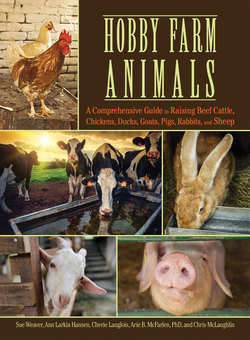Читать книгу Hobby Farm Animals - Chris McLaughlin - Страница 38
На сайте Литреса книга снята с продажи.
Transport and Shrink
ОглавлениеUnless you own your own cattle trailer and pickup truck, you’ll need to hire someone to move your cattle from the farm to the auction barn or processing plant. The auction barn or processor will be able to put you in contact with truckers who work in your area, or a neighbor may have a trailer and be willing to do the hauling for you. If you’re a member of a beef producers’ association and participating in a group sale, trucking arrangements are often included as part of the sale. Some small processors may pick up cattle as part of their services.
Set a date and time for the trucker to show up, anticipating some slack in the schedule. Truckers often make stops at several farms to fill a trailer, and, once in a while, somebody has forgotten to pen the cattle or a steer hops a fence. Have your animals in the pen, or even in the crowding tub, before the trucker arrives.
As previously discussed, traveling is stressful for cattle, and they show it by losing weight. Some of the weight is lost in manure or urine, but most is lost by dehydration. This loss is called shrink, and the farther cattle are hauled, the more shrink they will experience. Because most cattle are sold by the pound, shrink reduces their price. To reduce the amount of shrink, see that your cattle get a good drink before being loaded and that they are loaded calmly. Hiring a calm trucker helps a lot. A trailer with good footing, so they don’t slip, also goes a long way toward reducing stress.
Truckers generally charge by miles traveled divided by the number of cattle being hauled. Trucking charges add up quickly, especially when gas prices are high, so it’s a good idea to coordinate cattle shipments with neighbors. Often, the trucker will be able to help with this if you call him far enough in advance. A cattle trucker usually keeps a list of people with cattle to ship, and when he’s got a full load, he can give you a call and set the date.
